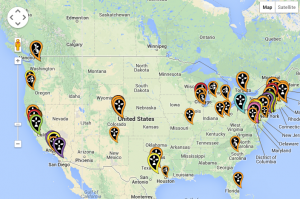Food Justice Subscribe
A selection of initiatives, blogs, resources and communities on Jewcology which focus on food justice.
From the Blogs
He Has Clout in Washington and Klout in Social Media — And He’s Vegan
Vegans might feel virtually invisible within the Jewish community as a whole. But The Beet-Eating Heeb is here to deliver hope. One of the most visible Jews in the Social Media World – and these days, what other world is there? – has become a vegan. Or, as BEH likes to say, this person has joined the Great Jewish Vegan Conspiracy (1). If you're one of the few people who is not following William @Daroff on Twitter, you must be Amish. But, regardless, The Beet-Eating Heeb is pleased to introduce you. William Daroff at The ...
What’s New in the World of Emergency Food? Part 2
Stockbox: Saving the Endangered Neighborhood Grocer Post by Karin Fleisch, an independent food security consultant and Dean’s Scholar at NYU Wagner. She is a Kol Tzedek Fellow at AJWS and serves on the board of Uri L’Tzedek. --------------------------------------------------------------------- Do you live in the US? Do you live more than one mile from a grocery store? Do you lack access to a vehicle? If you answered 'yes' to all three questions, welcome to the club - you live in a food desert. It's not a particularly desira...
Purim and Vegetarianism
Purim and Vegetarianism By Richard Schwartz There are many connections between the joyous holiday of Purim and vegetarianism: 1. According to the Talmud, Queen Esther, the heroine of the Purim story, was a vegetarian while she lived in the palace of King Achashverus. She was thus able to avoid violating the kosher dietary laws while keeping her Jewish identity secret. 2. During Purim it is a mitzvah to give "mat'not evyonim" (added charity to poor and hungry people). In contrast to these acts of sharing and compassion, animal-based diets involve the feeding of ...
Tu B’Shvat and Vegetarianism
Tu B'Shvat and Vegetarianism Richard H. Schwartz Tu B'Shvat is arguably the most vegetarian of Jewish holidays, because of its many connections to vegetarian themes and concepts: 1. The Tu B'Shvat Seder in which fruits and nuts are eaten, along with the singing of songs and the recitation of biblical verses related to trees and fruits, is the only sacred meal where only vegetarian, actually vegan, foods, are eaten. This is consistent with the diet in the Garden of Eden, as indicated by God's first, completely vegetarian, dietary law: “And God said: ‘Behold, I have ...
A Sex Therapist, A Book Called “Holy Eating,” and The Beet-Eating Heeb
If the Beet-Eating Heeb were to write a book, he might call it "Holy Eating." After all, what two words better describe Jewish veganism? So imagine The Beet-Eating Heeb's surprise (he won't say dismay) when he discovered a newly published book called "Holy Eating." And the author not only happens to be a fellow member of the Pittsburgh Jewish community, he is someone BEH is personally fond of -- Dr. Robert Schwartz. But wait a minute. The last time BEH checked, his friend Bob Schwartz was working as a sex therapist. Now he ...
Tu Bishvat: Seasonal Fruit and the New Year for Trees
The month of Sh’vat (January 11-February 10, 2013) includes the holiday of Tu Bishvat (January 25-26, 2013), which is a particularly significant day for contemporary Jews who are passionate about nature, ecology and farming. Today, this relatively minor holiday has become a key celebration of our sacred connection with fruit trees, food and the natural world. However, amidst our delight in this bounty, we would do well to reflect critically on what fruits we enjoy, when we consume them and where they come from. Tu Bishvat is not a biblical holiday. In Mishnah ...
Canvassing for the Farm
As a part of Earth’s Promise work to establish an Urban Farm supported by Local Sustainable Economy, employees and volunteers took to the streets to interview local businesses. All of the businesses that we interviewed are located in neighborhood “Gimel” in Beer Sheva. Many of the businesses have been operating in the neighborhood for a many years. It is important when starting a Local Sustainable Economy to understand the needs of the local businesses. Earth’s Promise did a survey to learn about how an Urban Farm providing local organic produce could help them. ...
Why Is This Night Different? Thoughts on Tu Bishvat
WHY IS THIS NIGHT DIFFERENT? THOUGHTS ON TU BISHVAT Richard H. Schwartz One of the highlights of the Passover Seder is the recitation of the four questions that consider how the night of Passover differs from all the other nights of the year. Many questions are also appropriate for Tu Bishvat, which starts on Friday evening, January 25 in 2013, because of the many ways that this holiday differs from Passover and all other days of the year. While four cups of red wine (or grape juice) are drunk at the Passover Seder, the four cups drunk at the Tu Bishvat Seder vary in ...
Join Us! Houston’s Jewish Food Summit – January 27, 2013
Join us in Houston on Sunday, January 27th for a morning of learning and hands-on workshops at the intersection of sustainability and Jewish values! At Texas' first Jewish Food Summit, we'll explore how to integrate ancient wisdom into our contemporary lives. The program will feature guest speakers, informative workshops, and a tree-planting followed by a special Tu B'Shvat seder--a special meal to celebrate the Jewish New Year for the Trees. All are welcome! What: Houston Jewish Food Summit When: January 27, 2013, 9:45 a.m. - 1:30 p.m. Where: Congregation Brith ...
Should Jews be Vegetarians?
Should Jews Be Vegetarians? And God said: "Behold, I have given you every herb yielding seed which is upon the face of all the earth, and every tree that has seed-yielding fruit -- to you it shall be for food." Genesis 1:29 I believe strongly that Jews should be vegetarians (and preferably vegans) today because of God’s strictly vegan dietary regimen above and because meat consumption and the ways in which meat is produced today conflict with Jewish teachings in at least six important areas: 1. While ...
Urban Agriculture and Bringing Food Closer to Home
A trip to the supermarket or shuk is usually started by a stroll down the fruit and vegetable aisles. These are also the most impressive rows studded with colors and smells, a myriad of sensations for the senses to experience. While many people seem to be experts in how to pick the most quality produce on the shelf by checking texture, smell, and even knocking on some fruits to listen to the hollow sound, very few could tell you where this food comes from. If we did a survey to find out, many people would guess from somewhere in the country. The question is: does it matter ...
Celebrating Miracles: A Chanukah Message
Celebrating Miracles: A Chanukah Message Daniel Brook, Ph.D. & Richard H. Schwartz, Ph.D. [A longer version of this article can be found in the holidays’ section at JewishVeg.com/schwartz] Chanukah commemorates the single small container of pure olive oil — expected to be enough for only one day — which, according to the Talmud (Shabbat 21b), miraculously lasted for eight days in the rededicated Temple. A switch to vegetarianism would be using our wisdom and compassion to help inspire another great miracle: the end of the tragedy of world hunger, therefore ...
FeastForward.org Releases a New Video with Sandor Katz
FeastFoward.org, an online web based video series powered by Jewish Farm School, released a new video today featuring fermentation revivalist Sandor Katz. Sandor shares his recipe for perfect sauerkraut, the favorite sustainable Jewish food used to preserve the winter vegetable harvest. Fermentation is more than just a preservation technique. It is a dance with micro-organisms that enables us to eat delicious, healthy, locally grown foods throughout the entire year. It is a practice that has been going on for millennia and is a crucial component of a sustainable ...
Reflections Before the Hazon Food Conference
We are getting ready to attend the Hazon Food Conference, which has brought about a bit of a reflection. I've been thinking this past fall, as we investigate our institutional role in the future, abou tthe futility I felt about going to farmer's markets last year. About how much work it took to grow everything. How much money we lost on our mistakes. All of the times we connected with people, and then lost those connections. Things like this get me down, but if I were to stop and reflect on what my thoughts were when I "joined" this movement, ...
Connections Between Chanukah and Vegetarianism
Chanukah and Vegetarianism While few people associate Chanukah with vegetarianism, there are many connections between plant-based diets and the Festival of Lights: Richard H. Schwartz, Ph.D. 1. According to the Book of Maccabees, some Maccabees lived on plant foods to "avoid being polluted like the rest" by eating non-kosher foods, when they hid in the mountains to avoid capture. 2. The foods associated with Channukah, latkes (potato pancakes) and sufganiyot (fried donuts) are vegetarian foods, and the oils that are used in their preparation are a ...
The Torah Verse That Turned Two Meat-Eaters into Beet-Eaters
You don’t need to unfurl the Torah scroll too much, or turn too many pages in your Bible, to find the foundational verses of religion-based vegetarianism. It’s right there in the opening chapter of Genesis. Discovering this changed The Beet-Eating Heeb’s life and the life of Wife of BEH, too. Their discovery occurred on Rosh Hashanah morning, 5766, when The Beet-Eating Heebs were still meat-eating Heebs. The morning’s service had plodded along for two hours or so when the Torah was taken from the Ark to be read. At this point, ...
MIRACULOUSLY STRETCHING THE OIL: CHANUKAH AND VEGETARIANISM
The Jewish festival of Chanukah commemorates the miracle of the oil that was enough for only one day, but miraculously lasted for eight days in the liberated Temple in Jerusalem. Hence, this holiday is a good time to consider our own use of fuel and other resources. Like Chanukah’s miraculous extension of scarce resources, vegetarianism also allows the increasingly scarce resources of our contemporary world to go much further. This is no trivial matter, since it is expected that many future conflicts between nations will involve scarcities of oil, water and other ...
Jacob’s Lentil Stew MMMMM…..
Winter is around the corner. Along with it comes the relatively colder air (we are in Beersheba), and relative rain (again, Beersheba). Nonetheless, the winter plantings have begun. It is a fantastic time of year where the Earth somehow can tell; you are really craving a warm bowl of veggie soup. Of course there are all of the tubers and roots, like potatoes, carrots, radish , onions, and garlic. Then there are the leaves and stalk such as celery, parsley, and cilantro. Don’t forget beans and lentils are also winter crop varieties. The Torah is also in line with ...
Seed Sovereignty, Tikkun Olam, and Gardening at Home
And God said: "Behold, I have given you every herb yielding seed which is upon the face of all the earth, and every tree that has seed-yielding fruit — to you it shall be for food." Gen. 1:29 So, this is our (Pushing the Envelope Farm’s) first posting on Jewcology. Woo-hoo! In honor of this, I thought that I would begin at the beginning: a seed. This month at the farm, we’ve been thinking a lot about what it means to be food independent. There was a talk at the Great Lakes Bioneers by Dr. Vandana Shiva. She’s a remarka...
Meet and Greet The Beet-Eating Heeb
The Beet-Eating Heeb is here to save the day! Or at least to fill a void. Blogs devoted to vegan and vegetarian Judaism have all but vanished. Consider: Heeb ‘n’ Vegan, once a thriving place in cyberspace, hung an “out-of-business” on its door in 2010. Shalom Veg, another favorite of meat-abstaining Jews, has gone months without posting new content. The last thing the world needs is another blog. Except in this case. As interest in all things vegan and vegetarian continues to grow, the Beet-Eating Heeb (BEH for ...





